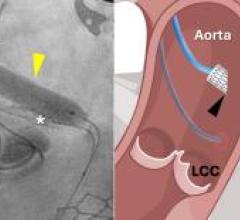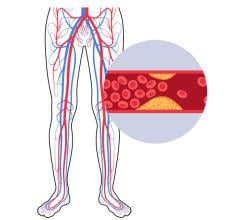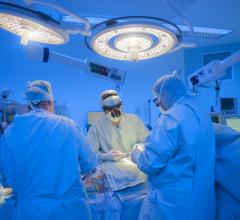
The FineHeart Transcutaneous Energy Transfer (TET) System for the ICOMS cardiac assist device. 1. The ICOMS heart pump. 2. The implanted TET transfer pad. 3. The external energy transfer pad.
January 13, 2021 — FineHeart, a preclinical-stage medical device company developing a novel left ventricular assist device (LVAD), successfully completed a seven-day study of its Transcutaneous Energy Transfer (TET) System for recharging the ICOMS implantable battery without any cords or drivelines through the skin.
FineHeart's TET is a system with no percutaneous driveline that transfers energy through the skin to charge the ICOMS pump battery. TET is rapidly implantable (less than 15 mins) and will give patients autonomy without the need for tethering cables from the device leading outside of the body. The elimination of the external driveline will reduce infections and complications that cause high rates of mortality with current circulatory support systems used in severe heart failure patients.
This type of wireless power system for LVADs has been in development for years, but this system appears to be making strides for commercialization. A wireless power system would solve many of the issues with current LVAD heart pumps used for long-term bridge-to-transplant or as a destination therapy. These types of systems promise to eliminate potential for infection from drive lines through the skin and enable patients to live more normal life with an LVAD.
This TET power system is designed for the FineHeart Implantable Cardiac Output Management System (ICOMS) LVAD in development to address severe heart failure.
"We are delighted to have succeeded in this major technological advancement proving the ability to power a cardiac assist device via an intelligent and minimally invasive TET system. This is a breakthrough in treating patients with severe heart failure who will be able to regain a quasi-normal quality of life without any device connected to their skin," said Arnaud Mascarell, CEO and Founder, FineHeart. "We are very pleased with the success of this study, which is a world-first: to date, no TET system of this size supporting the pulsatility function has been realized. This study marks another crucial milestone for FineHeart and further validates the design freeze of our technology."
The trial confirms the TET's ability to operate and provide power to the miniature heart pump in pulsatile mode and makes it the smallest TET system study ever completed in this domain. The energy transfer system was safely tested as quickly implantable (15 minutes), having low energy consumption and avoiding tissue heat absorption. These benefits will ease recovery for already fragile patients. Furthermore, eliminating an external driveline removes the main cause of infection and complications for patients implanted with an LVAD and will reduce morbidity and mortality rates.
The ICOMS intracardiac location and its ability to synchronize with the heart's natural contractions make it exceptionally energy efficient, the company said. ICOMS is designed to support, rather than replace, the heart. It also does not to go against the natural blood flow direction and fight against very high-pressure gradients, as the devices currently on the market do. The vendor said the ICOMS "feeds off" the intracardiac force generated with each contraction and relies on their strength to create additional and therapeutic blood flow. While respecting native cardiac flows, this support allows a significant reduction in its consumption, up to five times smaller than that observed in the cardiac asistance devices currently on the market.
The TET Invivo Study for the ICOMS Heart Pump
The TET system was implanted for seven days, with five temperature sensors located throughout the internal coil pocket. The inner coil diameter is 8 cm at 0.8 cm thick (same dimensions as an internal defibrillator, a device implanted daily in the G8 countries).
Heating was monitored for seven days with a consumption profile corresponding to a system operating at full speed, under extreme consumption conditions, well above nominal modes. The study showed that the average heating increase was around 1.5 +/- 0.2 °C, resulting in no tissue damage and no infection.
"The results of this study are remarkable and demonstrate that this small, mini-invasive TET system is functional and compatible with FDA guidelines and current regulations," said Professor Michael Acker, M.D., head of the cardiac surgery at the University of Pennsylvania Medical Center and FineHeart scientific advisory board member. "The ICOMS technology's unique ability to replicate the volumetric displacement of the blood, beat by beat, by generating physiological cardiac flows addresses a significant unmet clinical need and could improve the quality of life for a huge population suffering from severe heart failure today and tomorrow."
Heart failure (HF) is the second leading cause of death in the U.S. and Europe, a global pandemic affecting at least 26 million people worldwide and increasing prevalence. It is a degenerative disease leading to poor quality of life, frequent, costly hospitalizations, and early mortality. Severe HF requires device-based therapy to enhance the left ventricle's pumping capacity. Despite the need, currently, LVADs are large, cause substantial myocardial damage, are subject to infection and thrombosis risk, and the FDA restricts usage to cover only a small proportion of the HF population.
ICOMS is a Hybrid Device Similar to a Pacemaker and a Cardiac Assist Device
An innovative hybrid between a pacemaker and a cardiac assist device, FineHeart's ICOMS technology is the first fully intraventricular flow accelerator providing pulsatile, physiologic support of the native heart function without by-pass to the aorta. It respects the natural blood flow and is synchronized with the heart's contractions. No more than four inches long, ICOMS is the first miniaturized device with adjustable flow, allowing a physician to modify blood flow based on the patient's heart failure severity. The device is implanted in a mini-invasive procedure familiar to cardiac surgeons and takes less than ninety minutes to be put in place.
About FineHeart
FineHeart is a French medical device company headquartered in Bordeaux. Its patented ICOMS innovation holds the potential to treat 200,000 severe heart failure patients annually, with FineHeart initially targeting the 50,000 patients who are eligible for hemodynamic support, but today are not treated by current LVADs. The company said Stage IV heart failure is a $5 billion unmet market need.
FineHeart was founded in 2010 by a team of internationally renowned cardiac surgeons and cardiologists, led by Stephane Garrigue, M.D., Ph.D., CSO, Philippe Ritter, M.D., MS, co-inventor of cardiac resynchronization therapy (CRT); and FineHeart CEO Arnaud Mascarell. The company benefits today from 18 patent families and 69 patents.
FineHeart is supported by major U.S. venture capital firms specializing in the cardiovascular space, prime French investors, the European Union, and Region Nouvelle Aquitaine and Region Centre. It has been recognized by FierceMedTech as one of its "Fierce 15," designating it as one of the most promising private MedTech companies in the industry.
ICOMS is not approved for use or sale in any geography.
For more information: www.fineheart.fr


 January 15, 2026
January 15, 2026 









